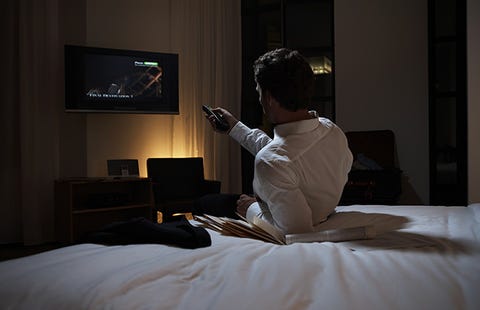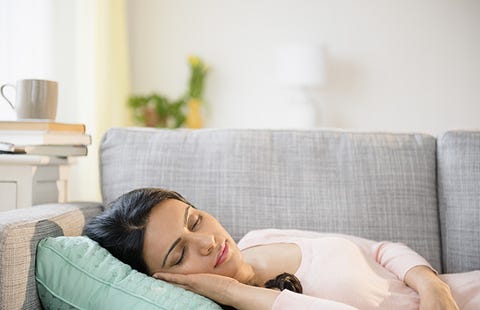Baby Falls Asleep While Nursing but Stays Latched
Getting a peaceful, uninterrupted, totally restorative 7 to 9 hours of sleep each night—that's the goal, right? (Find out how much sleep you need for your age.) But that perfect, nightly trip to dreamland is, well, just a dream for many. According to the most recent Gallup poll, 40% of us are getting fewer than 7 hours a night.
You already know about countless things you can do during the day to increase your chances of ample shut-eye at night: exercising regularly, avoiding booze and afternoon caffeine hits, and powering down your electronics well before your head hits the pillow. But what about those moments when you're actually in bed, casting about for a way to drift off? Here, 5 common causes of sleeplessness—and how to tackle them head on:
The Sleepless Situation: Your brain just won't power down.
The Solution: Time to put your (over) thinking to good use: See how many sleep-related words you can come up with. Keep going. And going...getting sleepy yet? According to a study published in the Journal of Applied Social Psychology, participants who conjured up restful words (like cozy, resting, and relaxed) slept an impressive 62% longer than those who didn't. If vocab isn't your strong suit, apply your active mind to a scenic-imagery romp. Researchers from the University of Oxford found that the act of "imagery distraction" before sleep—aka imagining a pleasant scene, like a stroll through a meadow—significantly reduced the amount of time it took people to fall asleep and lessened any sleep-related worries.
MORE: 7 Reasons You're Tired All The Time
The Sleepless Situation: You binged on Scandal right before bed.
The Solution: If you're still going to bed while Netflix is streaming, you either haven't heard of the many studies that recommend against screen time right before bed, or you're willfully ignoring them (understandable). If you can't settle all the mind-churning over Olivia and Fitz, distract yourself with a book—as boring a book as you can find, suggests W. Christopher Winter, MD, director of the Martha Jefferson Sleep Medicine Center. Reading something on the bland side could tire out your eyes enough to send you to sleep, he says (anything exciting will stimulate you further). And next time, trade in Scandal for an old-fashioned book: According to a study from the Proceedings of the National Academy of Sciences, paperback readers have been found to fall asleep 10 minutes earlier than those who devour eBooks. Reading a printed book helps you stay asleep, too. (Learn how you can balance your hormones for better sleep and weight loss withThe Hormone Reset Diet.)

Leonard McLane/Getty Images
The Sleepless Situation: Your spicy dinner's keeping you up.
The Solution: Switch your sleeping position—preferably to your left side, according to a study review published in JAMA Internal Medicine. While you may know from experience that sleeping on your back only adds fuel to the acid-reflux fire in your throat, it's possible that lying on your right side can also fan the flames. Though researchers are still puzzled by why this might be, they believe it might be caused by the relaxing of your lower esophageal sphincter (the portion of your esophagus that meets the stomach). In one study, patients sleeping on their left sides experienced 37% fewer reflux symptoms than those slumbering on their right.
MORE: 60-Second Fix For A Stiff Neck
The Sleepless Situation: It's 3 AM and you just cannot summon sleep.
The Solution: Stop trying to will yourself to dreamland: Open those eyes and stare at the ceiling (seriously). It's called "paradoxical intention" and it's simple and effective, according to a study published in the journal Behavioral and Cognitive Psychotherapy. Scottish researchers instructed participants to stay awake for as long as possible by keeping their eyes open after they turned out the lights for bedtime—no reading or other activities that would keep someone awake were allowed. Those who held their eyes open fell asleep about 41% more quickly than those who actually shut their eyes. And 70% of those who kept their peepers ajar actually noticed a quicker approach of slumber.
The Sleepless Situation: You slept in this morning (and took an afternoon nap).
The Solution: First things first: Are you trying to go to sleep at your normal bedtime? That's a mistake, says Michael Perlis, PhD, an associate professor and director of UPenn's Behavioral Sleep Medicine Program. Any sort of deviation from your normal sleep schedule is never a good idea, but if you absolutely have to sleep in for an extra hour one day, push your bedtime back an hour later. "You need to balance the books," says Perlis. But that doesn't give you a free pass to sleep in on the following day—that's when you need to get back on track, suggests Perlis.

JGI/Jamie Grill/Getty Images
Amber Brenza Amber Brenza is the health editor at Women's Health, and she oversees the website's health and weight loss verticals.
This content is created and maintained by a third party, and imported onto this page to help users provide their email addresses. You may be able to find more information about this and similar content at piano.io
Baby Falls Asleep While Nursing but Stays Latched
Source: https://www.prevention.com/health/a20487197/5-tricks-to-help-you-fall-asleep/
0 Response to "Baby Falls Asleep While Nursing but Stays Latched"
Post a Comment